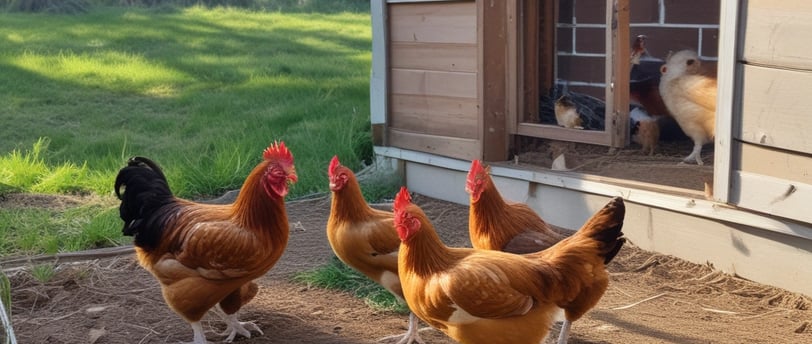Essential Supplies for Raising Backyard Chickens
2/25/20255 min read


Choosing the Right Coop
When it comes to raising backyard chickens, the selection of an appropriate coop is paramount to ensure the comfort and safety of your flock. A well-designed chicken coop not only provides a secure shelter from predators but also offers a suitable living space where chickens can thrive. One of the key factors to consider when choosing a coop is its size. Chickens require adequate space to move around, so it is essential to provide at least 4 square feet per bird inside the coop and 10 square feet per bird in the outdoor run. If the coop is too small, it can lead to stress, aggression, and health problems among the birds.
Ventilation is another critical consideration. Proper airflow within the coop is necessary to prevent the buildup of moisture and ammonia, which can cause respiratory illnesses in chickens. Ensure that the coop design includes windows or vents that can be opened and closed based on the weather conditions. In colder climates, insulation is important to protect your flock from frigid temperatures. Insulated walls or the use of heat lamps during winter months can help maintain a comfortable environment for the chickens.
When it comes to materials, choose durable options that can withstand the elements. Wooden coops are popular due to their insulation properties, but they require regular maintenance to prevent rot and pests. Alternatively, metal coops are long-lasting and easier to clean. There are various coop designs available, from pre-made kits to DIY builds, allowing chicken keepers to select a style that suits both their needs and budget. Beyond the coop itself, the placement of the shelter plays a significant role in the overall well-being of your flock. Position the coop in a spot that offers shelter from harsh weather and is safe from predators.
Feeders: Keeping Your Chickens Nourished
Providing a balanced diet is essential for the well-being and productivity of your backyard chickens. Choosing the right type of feeder can significantly impact the health of your flock, as it ensures a consistent and adequate supply of food. Several feeder designs cater to different flock sizes and feeding behaviors, making it essential to select one that meets your specific requirements.
One common type of feeder is the gravity feeder, which allows chicken feed to flow into a trough as it is consumed. This design is relatively user-friendly and minimizes the risk of spillage. Additionally, the use of treadle feeders, which require chickens to step on a plate to access the feed, helps deter pests and reduces waste, as only the chickens can trigger the release of feed. Adjustable-height feeders can also be beneficial, particularly when raising chicks alongside adult hens, as they enable you to accommodate the growth of your flock.
Moreover, automatic feeders are becoming increasingly popular among chicken keepers, especially for those with larger flocks or busy schedules. These feeders can dispense food at set intervals, ensuring that your chickens receive a consistent nourishment supply without requiring frequent attention. However, it is essential to maintain cleanliness in these devices, as residue and mold can pose health risks to your chickens.
Implementing regular maintenance practices involves cleaning the feeders at least once a week to remove any leftover feed and prevent mold or pests. Frequent refilling of feeders with fresh feed is vital, as providing stale or contaminated feed can lead to health concerns. Ultimately, the right feeder design and maintenance routine are key to keeping your chickens nourished, which directly contributes to their overall happiness and productivity.
Watering Solutions for Your Flock
Proper hydration is crucial for the health and well-being of backyard chickens. Just like any other living creature, chickens require an adequate supply of clean water to thrive, as water facilitates digestion, nutrient absorption, and temperature regulation. Therefore, carefully selecting an appropriate watering system is essential for any poultry keeper.
There are several watering solutions available for chicken owners, each with its own advantages. Traditional waterers, often made from plastic or galvanized metal, are easy to find and set up. They can accommodate small to medium-sized flocks. However, they may require frequent cleaning and refilling, especially during hot weather when chickens drink more water.
Nipple systems represent another popular choice for providing water to backyard chickens. These systems consist of containers that are fitted with nipples, allowing chickens to access water without spilling or contaminating it. This type of system is particularly beneficial in reducing waste and ensuring that the water remains clean, making it ideal for larger flocks.
For those seeking convenience, automatic waterers could be the best option. These systems are designed to refill themselves, providing a continuous supply of fresh water to the flock. This can save a significant amount of time, particularly for chicken keepers with larger operations or those in busy households.
When selecting a watering solution, consider your flock size, local climate, and ease of maintenance. For smaller flocks in mild climates, traditional waterers may suffice. Conversely, larger flocks or those located in more extreme weather conditions may benefit from nipple or automatic systems that protect against freezing in winter months. Remember to keep the water source clean and ensure it is easily accessible to your chickens at all times, as this promotes optimal hydration and overall flock health.
Essential Accessories for Chicken Care
Raising backyard chickens entails a commitment to their well-being, and having the correct accessories can significantly enhance both their comfort and your convenience as a chicken owner. One essential accessory is the nesting box. Nesting boxes provide a safe and cozy space for hens to lay eggs, which contributes to a productive laying process. Ideally, each box should be 12 inches wide and deep to accommodate the hens comfortably. Moreover, ensuring that these boxes are situated in a quiet area of the coop can encourage regular egg-laying and help establish a routine among your flock.
Perches are another critical addition to any chicken coop. These elevated resting spots allow chickens to sleep safely off the ground, enhancing their sense of security at night. Chickens are naturally inclined to roost; therefore, providing ample perching space will promote natural behaviors and improve their overall health. Selecting materials that are easy to clean and sanitize will further facilitate the maintenance of hygiene within your coop.
In addition to basics like nesting boxes and perches, coop cleaning supplies are vital for maintaining a healthy environment. Regular cleaning helps prevent the buildup of waste, which can lead to health issues among your backyard flock. Essential cleaning supplies might include shovels, brooms, and disinfectants suitable for use around chickens. Moreover, health supplements can be an integral part of chicken care to promote robust growth and a healthy immune system.
Moreover, providing enrichment items such as dust baths and toys is crucial for the chickens’ mental and physical health. Dust baths assist in feather maintenance and parasite control, ensuring your chickens remain comfortable and hygienic. Toys can stimulate their natural foraging instincts, contributing to a well-rounded and thriving chicken ecosystem. With the right accessories, you can cultivate a harmonious environment that enhances the vitality of your backyard chickens.
